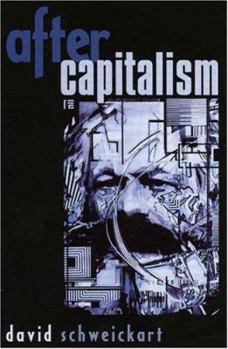After Capitalism
Select Format
Select Condition 
Book Overview
Since first published in 2002, After Capitalism has offered students and political activists alike a coherent vision of a viable and desirable alternative to capitalism. David Schweickart calls this... This description may be from another edition of this product.
Format:Paperback
Language:English
ISBN:0742513009
ISBN13:9780742513006
Release Date:July 2002
Publisher:Rowman & Littlefield Publishers
Length:224 Pages
Weight:0.70 lbs.
Dimensions:0.6" x 6.0" x 9.1"
Customer Reviews
5 ratings
The most workable, realistic, and inspiring socialist system to date.
Published by Thriftbooks.com User , 15 years ago
After completing Dr. Schweickart's masterpiece I left with a true sense of empowerment and optimism. Economic democracy is only a theory on paper but the substance of the model is made so clear in "After Capitalism" you can almost perfectly imagine what the system would look like fully implemented. Schweickart breaks his theory into several important points: Worker self management. Using evidence from numerous scholars the book looks at the merits of having a macro econ. policy based on workers coops. Staying balanced with studies done by pro-coop Princeton economist and a critic of the Mondragon coop in Spain, he offers more than enough empirical evidence to come to a clear conclusion: Worker's coops are just as efficient, if not more so, as their privately owned counter-parts. Efficiency is only one plus of the coop though. The author digs deep to explore coop's relation to future business expansion, employment, and profit sharing. Social control of investment is the next major characteristic of E.D. All workers coop's are charged a flat tax that is diverted into a national investment fund. These funds are then transferred back to communities (on a per capita basis) through regional and local public banks. Banks then give grants to coops creating "profitable employment" and to groups of individuals who intend to start new coops. This is a weighty concept and I would read it with a pen and pad in hand. However, at the end of chapter three you will be well versed in the financial markets replacement and ready to defend the proposition if you so chose. The last major tenet of E.D. involves the market itself. Unlike the USSR or decentralized econ. planning schemes E.D. keeps the consumer market intact. He defends this stance well and shows how a consumer market can be a powerful aspect of a socialist system. The book also covers "socialist protectionism" to be practiced in place of free trade, a blueprint of reforms to move towards E.D., and ways to keep the average Joe's money safe in the transcending of capitalism. Much of the book is spent dismantling capitalism's contradictions and short comings. If you have free market sympathies be prepared to be challenged. I can not do the book justice in this short review but I suggest this book to all realms of the political spectrum. It will present a challenge to those on the right and make some new debates on the left. I am now a firm advocate of many of Schweickart's theories.
After Capitalism
Published by Thriftbooks.com User , 16 years ago
I am very impressed with After Capitalism by Loyola University Professor David Schweickart. Both of my grandfathers were socialists and my father was a member of the Socialist Labor Party. When I grew up I was not merely indoctrinated in socialism I was marinated in it. Despite all of this I never really was given a plausible explanation how a socialist economy was supposed to work, or a plausible explanation how our society could make the transition from our very mature form of industrial capitalism to a socialist economy. After Capitalism provides a plausible explanation for both.
don't miss this
Published by Thriftbooks.com User , 18 years ago
I just want to add my voice to those who have lauded this book. It is superb in every way. Also, I want to call attention to Morris Berman's work, especially to his last two books, "Wandering God," and "The Twilight of American Culture", which provide important supplements to Schweickart's analysis.
Is this already happening???
Published by Thriftbooks.com User , 20 years ago
This is a good book. It was recommended to me by a friend who took the professor's philisophy class. The professor provides an excellent lesson on capitalism. The economic democracy that the professor proposes is fascinating because it eliminates capitalism. First, the professor explains why capitalists are inherently bad for democracy, then he explains how we can do without capitalists, then he explains how we being to phase capitalists and their effects out of society. This is not a book that comes from far out in left field. In fact, I am the son of a father who is a member of a worker-collective right here in Chicago. Economic democracy is happening, but will it go as far as proposed in this book? If economic democracy is superior to capitalism, is there any other alternative for our future?
A vision of "Economic Democracy"
Published by Thriftbooks.com User , 21 years ago
The evils of centrally planned socialism on the Soviet model are widely proclaimed, but capitalism has equally negative side effects: gross maldistribution of the fruits of the economy, the breeding of a mass consumer culture, and destruction of the environment among them. Capitalism may well collapse under its own excesses, but what would one propose to replace it? Margaret Thatcher's mantra was TINA...There Is No Alternative. David Schweickart's vision of "Economic Democracy" proposes a serious alternative. Even more fundamentally, it opens the door to thinking about alternatives. His may or may not turn out to be the definitive "successor system," but he is a leader in breaking out of the box.




